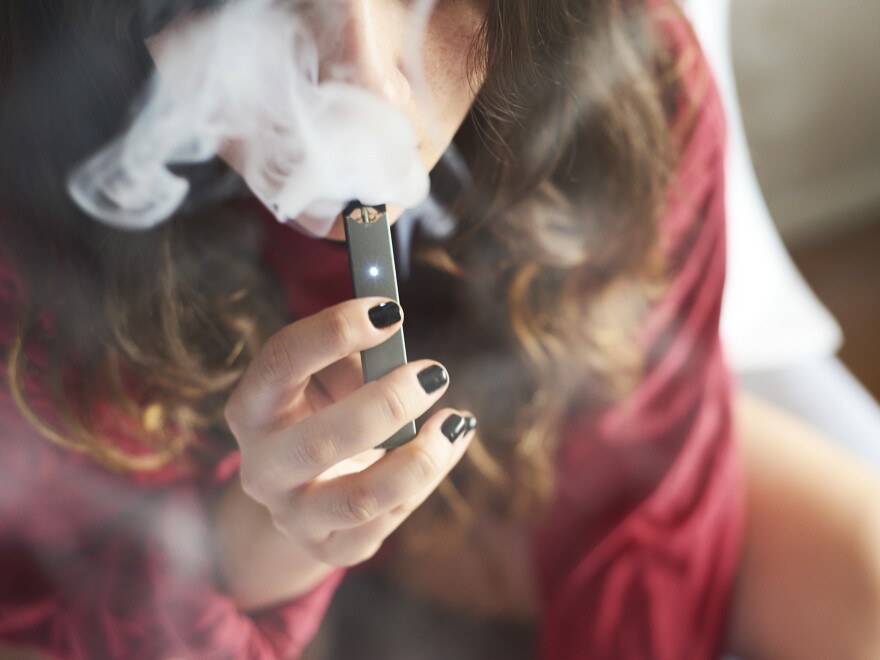The link between vaping and severe lung problems is getting a lot of attention.
But scientists say they're also worried about vaping's effect on teenage brains.
"Unfortunately, the brain problems and challenges may be things that we see later on down the road," says Nii Addy, associate professor of psychiatry and cellular and molecular physiology at Yale School of Medicine.
Potential problems include attention disorders like ADHD, impulse control issues and susceptibility to substance abuse.
There's no easy way to study precisely what nicotine is doing in a teenager's brain. But research on young animals shows that nicotine can interfere with processes that are critical to memory, learning, focus, impulse control and brain development.
"It's unfortunate that a whole generation of teenagers are basically guinea pigs for the effects of nicotine in the brain," says Frances Leslie, professor of pharmaceutical sciences at the University of California, Irvine.
Leslie says the problem is that nicotine mimics acetylcholine, an important chemical messenger in the brain. So nicotine is able to fool brain cells that have something called a nicotinic receptor.
Unfortunately, she says, "those parts of the brain that are actively maturing during adolescence are being actively controlled by nicotinic receptors."
Nicotine also acts on the brain's dopamine system, which plays a role in desire, pleasure, reward and impulse control.
It's still not clear what tweaking the dopamine system does to the brain of an adolescent human.
But in young mice, Leslie says, the result is alarming. "A very brief, low-dose exposure to nicotine in early adolescence increases the rewarding properties of other drugs, including alcohol, cocaine, methamphetamine — and these are long-term changes," she says.
Of course, nicotine-vaping products also contain lots of other substances, including flavors like bubblegum and pink lemonade. And Addy wonders whether these flavors might offer a dopamine kick of their own.
"If both nicotine and flavors are both acting on this same dopamine system in the brain," he says, "is that somehow facilitating and making it more likely that people will take products that have both flavors and nicotine?"
So Addy and a team of researchers studied rats that drank plain and flavored liquids containing nicotine.
"What we found is that the sweet flavors can make the nicotine more palatable in the oral cavity," he says, "but also act in the brain to increase nicotine taking."
This effect is especially troubling in a teenage brain, Addy says, which is more sensitive than an adult brain to rewards.
Animal research by another Yale University scientist suggests that vaping during adolescence can lead to long-term brain changes, like attention deficit hyperactivity disorder, Addy says.
"If there's exposure to nicotine early on, that can influence attentional processes later in life," he says.
So what might help reduce teen vaping?
One approach is to ban flavored products, something that was proposed by the Trump administration in September.
And if the ban happens, it could reduce the number of new vapers, says Janet Audrain-McGovern, a psychologist at the University of Pennsylvania.
Research shows that "if the first e-cigarette that you used was flavored, then you're more likely to go on and use an e-cigarette again," Audrain-McGovern says.
Another promising approach is to make nicotine-vaping products more expensive. When taxes forced up the price of tobacco products, Audrain-McGovern says, the number of young customers declined.
Finally, Audrain-McGovern thinks it should be harder for teenagers to buy vaping products online.
At the moment, many vaping websites simply ask visitors if they are underage before allowing a sale.
"I don't think it's that difficult to click the box that you're 18 or you're 21 and, if you have a credit card, to get those products," Audrain-McGovern says.
In August, Juul Labs launched a program that offers incentives to retailers that implement an age-verification system for customers.
But some measures that helped discourage smoking probably won't work as well against vaping, Audrain-McGovern says. For example, studies suggest that physically active teens are less likely than their peers to smoke but no less likely to vape.
Another challenge is that it's hard for scientists and regulators to keep up with the rapid pace of change in the vaping world.
"Teens who maybe four years ago were using predominately vape pens are now using Juul and some of the pod mods," Audrain-McGovern says.
And those newer products are designed to deliver higher levels of nicotine to the brain. More nicotine makes the products more addictive.
Copyright 2021 NPR. To see more, visit https://www.npr.org.







